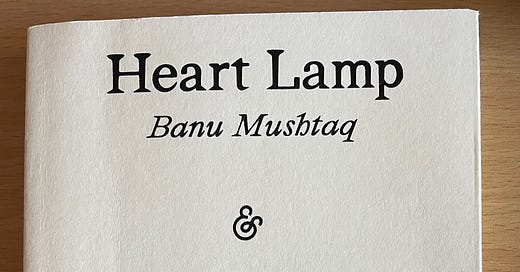KANNADA STORIES BURN BRIGHT
A Booker winner from India gives me pause and makes me wonder about awards.
As I began wrapping up my grandmotherly duties, I began reading Banu Mushtaq’s Heart Lamp which went on to win the International Booker a few weeks ago. This is a collection of stories in the Kannada language that have been translated by Deepa Bhasthi into English. Kannada is a south Indian language as is my mother tongue, Tamil, and this was a moment in the sun for Indian writers who are hard at work in the regional languages.
What I found engaging in this collection was how we see the lives of girls and women in Muslim communities in southern India, a subject that we don’t often get to read about in Indian writing originally conceived in English. Heart Lamp tells stories about the cultural life of Muslim communities in Karnataka. The women in these stories are oppressed as children, wives, mothers and grandmothers. It’s a pattern that will repeat itself through the generations.
The twelve stories of Heart Lamp take us into families caught in specific situations in their family lives. In the title story, we see the eroded soul of a woman, Mehrun, whose marriage is falling apart. When she returns to her parents’ home to seek some solace, there is no question of support. Family honor is paramount, after all, and it is shocking but entirely believable that parents would rather forsake their child’s unhappiness than deal with the prying questions and the wagging tongues of the people around them.
The whole house momentarily stood still. It felt unfamiliar to her. The mother who had kept her in her belly for nine months and raised her did not say ‘There you are. Come in, my dear,’ and her father, who used to delight in the little girl who jumped on his wide chest, didn’t have even a small smile of welcome, and neither her eldest brother, who proudly called her ‘my pari, my angel,’ nor Amaan, who had insisted that she must be sent to college, greeted her. Their wives stared at her as if she was from another planet.
In Stone Slabs For Shaista Mahal, we watch the capriciousness of a husband who professes undying love for his wife but seeks to marry a young woman the minute his wife dies.
In the story Fire Rain, the antagonist, Mutawalli, is irritated by his sister Jameela’s demand for a share in the family property. In an attempt to avoid confronting his sister with respect to his domestic conflict, he immerses himself in leading a communal issue which ironically makes him confront yet another issue related to property and belonging. We also watch Jameela’s own hypocrisy in resolving the issue. Once again family honor is at stake.
You take so many decisions for problems in the mohalla. You should have called me and said, here, take your share. Forget my situation; that Sakeena Akka’s case. She has neither a husband nor children old enough to work. How is she to arrange marriage for her two grown-up daughters?
The mutawalli saheb kept staring at the floor. How surprising it was that Jameela was talking so much. Why was he remaining silent? Images of mango groves, coconut groves, fields, places where they raised silkworms, and resplendent houses in the city passed before his eyes. Which of these could he share with his four sisters?
Excited as I was to read this collection of stories originally penned in the Kannada language, I wondered about the arguments that the Booker committee had made when they felt that this collection was exceptional. Mushtaq had brought attention to the mores of a community, the patriarchy and the ills that weighed down on communities one might rarely ever read about in English. I thought Deepa Bhasti’s thoughtful translation of the stories made these stories accessible to readers like me. Yet, having read several novels from the last many years of Booker winning translations, I felt that something was missing in Mushtaq’s collection. Why did I seem to find it wanting?
This work raised a question about the value and worth that we place on the selections of award committees. While judging a piece of work, should committees care more about the work itself than about its topicality or resonance? How should a committee weight the luminosity of the work against the relevance of the work in the world? How do we measure the value of craftsmanship in a literary work?
While not a Dalit woman herself, Mushtaq’s work delves into the experiences of marginalized communities, including Dalit communities, and challenges both Hindu supremacist and patriarchal structures within Muslim communities. Mushtaq’s experiences as a journalist clearly helped her shape the stories in this collection.




Ooh I just got this book in the mail. Thank you for this review and the context here. Looking forward to reading the book, equipped with your post!